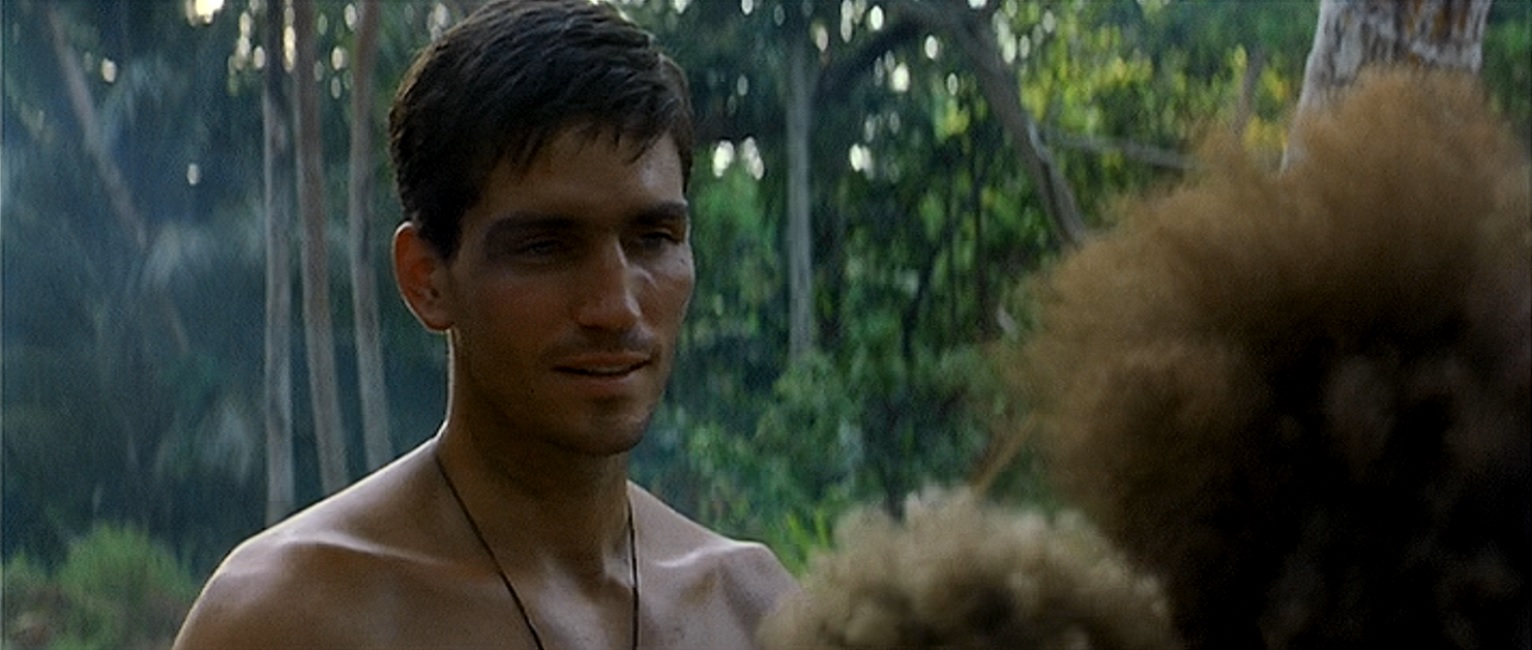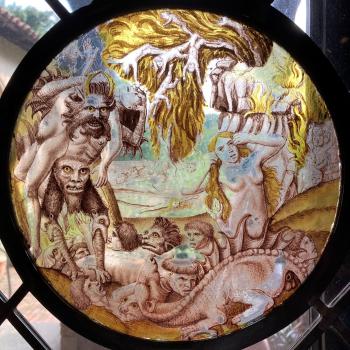by guest contributor Patrick Tomassi
At the beginning of Terrence Malick’s epic World War II film The Thin Red Line, Private Witt, played by Jim Caviezel, is AWOL on an island in the south Pacific, living with a Melanesian tribe. In those people, he encounters something that he cannot necessarily name – a beauty, peace, love – that overtakes him. He is happy with them – playing with the children, helping to build, swimming in the ocean. And he’s struck by the way they live with each other. Right before he is captured and returned to Charlie Company, he stands by as the islanders walk down the beach, clapping and singing “Jisas, Yu Holem Hand Blong Mi,” a hymn in an English pidgin. Throughout the film, Witt’s encounter with the Melanesian Christians becomes a continual point of reference for him.
After he is picked up, we see Witt in a conversation with Sgt Welsh, played by Sean Penn. “In this world, a man, himself, is nothing,” says Sgt. Welsh, “and there ain’t no world but this one.” “You’re wrong there, top,” Witt responds, “I seen another world.” “Then you’ve seen things I never will.” The Melanesian island is so different from the world of war in which he is immersed that it is as if it belonged to a different reality.
This interchange sets up the relationship between Welsh and Witt, which is a tension between nihilism and hope. Welsh is a hardened soldier, or so he tries to appear. He is fighting in a war he doesn’t believe in. After he runs through a hail of bullets to give morphine to a dying soldier, his commander tells him that he will be recommending him for the Silver Star. “Captain, you say one more word to thank me I’m gonna knock you right in the teeth,” Welsh responds. “Property. Whole fuckin’ things about property.”
That night, Witt and Welsh find themselves together. “I feel sorry for you, kid,” Welsh says, “this Army’s gonna kill you.” Witt looks calmly back at him as he goes on. “What difference you think you can make, one single man in all this madness? If you die, it’s gonna be for nothing. There’s not some other world out there where everything’s gonna be okay. There’s just this one.” All the while, Witt never answers, but everything is communicated in the intense look in his eyes. In the background, we hear a soft melody – the tune of the hymn sung at the beginning of the film. This musical leitmotif calls the viewer back to that “other world” that Witt, and we, have seen. He looks away, wipes a tear from his face, and looks back at Sgt. Welsh, and for several seconds they just sit there. He doesn’t have to answer.
This gaze shows up throughout the film. When the men capture an enemy gun post, Witt and a couple of others guard the prisoners. It is hot and filthy, and smells of rotting bodies. One man spits at the prisoners, and sticks broken cigarettes up his nose to block the smell. Witt looks on silently, and his eyes and the camera linger on their faces. He sees broken, defeated, terrified men, and offers them what he has – a piece of his candy. In his eyes is the same tenderness with which he looked at Sgt. Welsh.
After the battle, Sgt. Welsh sits with another sergeant, played by John C. Reilly, in a medical tent. “When I look at that boy dying,” Riley’s character says with a vacant look in his eyes, “I don’t feel nothing. I don’t care about nothing anymore.” “Sounds like bliss,” responds Welsh. “I don’t have that feeling yet – that numbness.” He is completely jaded and nihilistic, but he hasn’t managed to annihilate the pain he feels in front of human suffering. When he asks Witt whether he’s “still believing in that beautiful light,” Witt responds by saying that “I still see a spark in you.”
When Witt is killed later in the film, the men make him a simple grave. After everyone else has walked away, Welsh stays behind. He crouches at the foot of the makeshift grave. “Where’s your spark now?” he asks with tears in his eyes.
As the company prepares to move out, and marches past a graveyard to the beach, we hear Sgt. Welsh speaking in voiceover. “If I never meet you in this life,” he says, “let me feel the lack. A glance from your eyes, and my life would be yours.” He rejects the bliss of numbness. But who is he speaking to – whose eyes does he want to see? It is the same eyes that reached him through Private Witt’s gaze, the reason the Witt can look at everything in the way he does. If Witt met Christ in the Melanesian Christians, Welsh glimpsed Him in Witt, and now asks to see Him.
Every time I watch the film, it is those words that stick with me the most. How can he say that? What makes it possible to beg to feel the lack rather than forget the the face you have seen? Instead, most of us spend a good chunk of our lives trying to avoid that lack, looking for the numb bliss of John C. Reilly’s character. It is only possible for Sgt. Welsh to say this because he has seen that there is an answer; in the face of Private Witt, he has glimpsed “another world.”


















